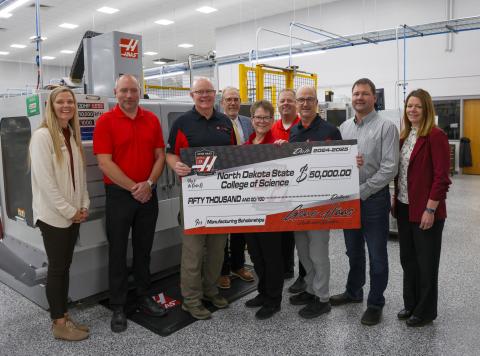
Article published by Bobbi Steffens at Wahpeton Daily News on October 22, 2024.
There is a growing demand for precision machinists in the workforce.
A local college has received grant funding to help reduce costs for students in that field of study.
The Gene Haas Foundation has awarded a $50,000 grant to support the Precision Machining Technology department at North Dakota State College of Science (NDSCS). The funds will be used to award scholarships to current and future NDSCS Precision Machining Technology students.
According to Academic Program Outreach Specialist at NDSCS Leslie Shirek, this year's grant follows a $50,000 grant from the Gene Haas Foundation in the fall of 2023. That grant resulted in scholarships for 10 first year Precision Machining Technology students.
The Precision Machining Technology program provides students with vital skills in CNC programming, setup and operation, production machining, mold and die making, toolmaking, and automated manufacturing.
“Students can utilize the scholarship dollars for tuition, tools, housing, or anything else to support their education,” said Precision Machining Technology Associate Professor/Program Coordinator Steve Johnson. “We are grateful for the Gene Haas Foundation's continued support of our program and our students. They are more for precision metalworking education than any other.”
Three representatives from Productivity Inc. visited NDSCS to present the check on behalf of the Gene Haas Foundation. The Gene Haas Foundation was established in 1999, by Gene Haas, founder and owner of Haas Automation, Inc., to support the needs of the local community.
Seeing a growing need for skilled manufacturing employees industry wide, the Foundation expanded its mission to include support for manufacturing training programs throughout North America and beyond.
By providing scholarship grants, sponsoring individual and team CNC competitions, and partnering with the very best CNC training programs in the world, the Foundation helps expand the availability of high-quality manufacturing technology training worldwide.
“Students are so appreciative of the financial support the Gene Haas Foundation provides them. The first ten students entering our Machining program obtain $2,500, automatically,” Shirek said. “They don’t need to apply for the scholarship, they merely need to register for classes and show up in the fall. The scholarship dollars continue on to our second year students and that is based on their GPA.”
This important grant from the Gene Haas Foundation marks a substantial investment in the education and training of future machinists at NDSCS. It reflects the foundation’s dedication to fostering the development of highly skilled professionals in the machining industry.
Precision machinists work with various tools and machines to create, modify, and repair precision parts and components. Their tasks typically include:
- CNC machining: Operating CNC (Computer Numerical Control) machines to cut and shape materials like metal, plastic, and wood to exact specifications.
- Blueprint reading: Interpreting technical drawings and specifications to understand project requirements.
- Setup and calibration: Setting up machines, including selecting and installing tools, fixtures, and attachments, and calibrating equipment for precise operations.
- Quality control: Inspecting and measuring finished parts using tools like calipers, micrometers, and gauges to ensure they meet required tolerances and standards.
- Toolmaking: Designing and fabricating tools and fixtures used in the manufacturing process.
- Troubleshooting: Identifying and resolving issues with machines, tools, or processes to maintain production efficiency.
- Production machining: Producing high volumes of parts, often working in a production environment where precision and speed are critical.
- Collaboration: Working closely with engineers and other team members to refine designs and improve manufacturing processes.
Overall, precision machinists play a crucial role in various industries, including aerospace, automotive, and manufacturing, ensuring high-quality components are produced accurately and efficiently.
“It’s a great time to look into becoming a machinist. No problem finding a job, outstanding scholarships and low cost tuition,” Shirek said. “This past summer we had an extreme facelift to the Precision Machining Lab with updated floors, lights, electrical and more. Students will learn in a state of the art facility with an excellent student to faculty ratio and our incredible instructors.”
The Gene Haas Foundation donates millions of dollars every year to manufacturing education and the community. In 2022, the Gene Haas Foundation provided more than $27 million in grants, bringing the total since inception to more than $175 million.